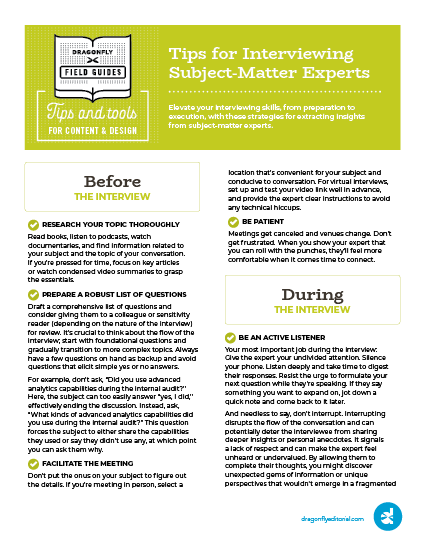Elevate your interviewing skills, from preparation to execution, with these strategies for extracting insights from subject-matter experts.
Before the interview
Research your topic thoroughly
Read books, listen to podcasts, watch documentaries, and find information related to your subject and the topic of your conversation. If you’re pressed for time, focus on key articles or watch condensed video summaries to grasp the essentials.
Prepare a robust list of questions
Draft a comprehensive list of questions and consider giving them to a colleague or sensitivity reader (depending on the nature of the interview) for review. It’s crucial to think about the flow of the interview; start with foundational questions and gradually transition to more complex topics. Always have a few questions on hand as backup and avoid questions that elicit simple yes or no answers.
For example, don’t ask, “Did you use advanced analytics capabilities during the internal audit?” Here, the subject can too easily answer “yes, I did,” effectively ending the discussion. Instead, ask, “What kinds of advanced analytics capabilities did you use during the internal audit?” This question forces the subject to either share the capabilities they used or say they didn’t use any, at which point you can ask them why.
Facilitate the meeting
Don’t put the onus on your subject to figure out the details. If you’re meeting in person, select a location that’s convenient for your subject and conducive to conversation. For virtual interviews, set up and test your video link well in advance, and provide the expert clear instructions to avoid any technical hiccups.
Be patient
Meetings get canceled and venues change. Don’t get frustrated. When you show your expert that you can roll with the punches, they’ll feel more comfortable when it comes time to connect.
During the interview
Be an active listener
Your most important job during the interview: Give the expert your undivided attention. Silence your phone. Listen deeply and take time to digest their responses. Resist the urge to formulate your next question while they’re speaking. If they say something you want to expand on, jot down a quick note and come back to it later.
And needless to say, don’t interrupt. Interrupting disrupts the flow of the conversation and can potentially deter the interviewee from sharing deeper insights or personal anecdotes. It signals a lack of respect and can make the expert feel unheard or undervalued. By allowing them to complete their thoughts, you might discover unexpected gems of information or unique perspectives that wouldn’t emerge in a fragmented conversation. Remember, every moment you let them speak uninterrupted is an opportunity to gather richer, more comprehensive content.
Embrace the pause
Silence can be golden. Sit in that uncomfortable silence when the expert is finished speaking for as long as you can — it gives your expert a moment to reflect and often leads to more profound insights. After you’ve waited a few beats, you can sometimes simply ask, “What else?” Often the richest answers from your SME will come after they’ve already given a basic answer, or their first response. Asking “what else” invites them to dive deeper or perhaps give a more personal or unconventional response to the question.
Build rapport
Lead with lighter topics before diving into hard-hitting questions. Ease them into the conversation by asking foundational or background questions first before getting to the heart of the story. You’re not “tricking” your subject into letting down their guard, here. You’re simply giving them a chance to settle into the conversation and get comfortable talking with you.
Press record and take notes
Recording the discussion preserves the integrity of your conversation but always ask for permission before recording. Bring multiple devices to ensure you don’t miss any soundbites and as you take notes, jot down time stamps when the expert says something you know you’ll want to use later.
After the interview
Review and reflect
Take a moment to review your notes and recordings. Reflect on key insights, surprises, and areas that might require further exploration or clarification. Do this as soon as you can after the interview while your impressions of the speaker, and their shared insights, are still fresh on your mind.
Transcribe and organize
Consider transcribing the interview, either manually or using transcription software. This provides a written record that’s easier to reference. Organize your notes and transcriptions in a way that’s easily accessible for future use. Having a written transcript ensures accuracy and offers a goldmine of content that can be repurposed into various formats. Whether it’s blog posts, social media snippets, infographics, or even podcasts, the transcript becomes a versatile resource and maximizes the value of the interview.
Follow up
After reviewing the material, you might have additional questions or need clarification on certain points. Reach out to the expert to clarify any gaps in your knowledge.
And always thank your SME for sharing their time and expertise with you. Remember, you are the trusted vehicle for sharing their insights, stories, and valued experiences!


